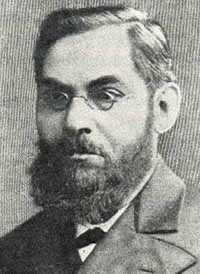Judah Leib Gordon

Judah Leib (Ben Asher) Gordon, also known as Leon Gordon, (December 7, 1830, Vilnius, Lithuania – September 16, 1892, St. Petersburg, Russia) (Hebrew: יהודה לייב גורדון) was among the most important Hebrew poets of the Jewish Enlightenment.
Gordon was born to well-to-do Jewish parents who owned a hotel in Vilnius. As a privileged child, he was able to study Torah with some of the great educators of the city, and soon proved to be an exceptional student. He had already mastered the entire Bible by the age of eleven, and was fluent in hundreds of pages of Talmud. Matters took a sharp turn when Gordon was fourteen, and his father went bankrupt. Unable to finance his son's education any longer, the younger Gordon began a course of independent study on one of the many study halls in the city. In just three years, he had mastered almost the entire Talmud and dozens of other religious texts. By that time, however, he was also drawn by the spirit of the Enlightenment that was sweeping across the city. He began reading secular literature and learning foreign languages, and he befriended some of the leading Enlightenment figures of the time, including Kalman Shulman, the poet Abraham Dob Bär Lebensohn and his son Micah Joseph Lebensohn.
With the financial situation deteriorating at home, Gordon, then twenty-two, decided it was time for him to pursue a career. He received a teaching certificate from the local rabbinical college, and became a school teacher in some of the smaller towns that housed major yeshivas, including Ponivezh and Telz. During the twenty years he spent as a teacher, he produced his most important work as a poet and author. Having an established reputation, he was invited by the Jewish community of Saint Petersburg to serve as secretary of the community and of the Society for the Spread of Enlightenment among the Jews of Russia. He died in Saint Petersburg in 1892.
Gordon took a leading part in the modern revival of the Hebrew language and culture. His satires did much to rouse the Russian Jews to a new sense of the reality of life, and Gordon was the apostle of enlightenment in the Ghettos. His Hebrew style is classical and pure. Much of his poetry revolves around biblical and historical themes. These include The Love of David and Michal (1857), King Zedekiah in Prison (1879), Judah's Parables (1859), David and Barzilai, Osenath, Daughter of Potiphera, From between the Lion's Teeth, and From the Depths of the Sea. The works were intended to disseminate Enlightenment values and had a profound impact on Jewish life. Many feel his romantic works lack the same militancy of his poetic works, though his advocacy resurfaces in his realistic novels. Gordon also published collections of fables, most of them translated. In works such as "Little Fables for Big Children", he continues to advocate for the adoption of Enlightenment values, as he does in his memoirs, published in the last year of his life. Among his other writing on social issues is The Point on Top of the Yod, dealing with the rights of women. His poems were collected in four volumes, Kol Shire Yehudah (St. Petersburg, 1883–1884); his novels in Kol Kitbe Yehuda (Collected Writings of Gordon, Odessa, 1889).
Notes
References
- Israel and Zionism Biographies
 This article incorporates text from a publication now in the public domain: Chisholm, Hugh, ed. (1911). "Gordon, Leon". Encyclopædia Britannica (11th ed.). Cambridge University Press.
This article incorporates text from a publication now in the public domain: Chisholm, Hugh, ed. (1911). "Gordon, Leon". Encyclopædia Britannica (11th ed.). Cambridge University Press.
Books
Stanislawski, Michael: "For Whom Do I Toil?" Judah Leib Gordon and the Crisis of Russian Jewry, New York/Oxford 1988.